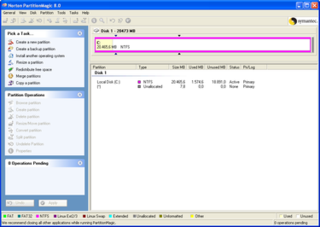
This timeline of computer viruses and worms presents a chronological timeline of noteworthy computer viruses, computer worms, Trojan horses, similar malware, related research and events.
A rootkit is a collection of computer software, typically malicious, designed to enable access to a computer or an area of its software that is not otherwise allowed and often masks its existence or the existence of other software. The term rootkit is a compound of "root" and the word "kit". The term "rootkit" has negative connotations through its association with malware.

Blaster was a computer worm that spread on computers running operating systems Windows XP and Windows 2000 during August 2003.

Gen Digital Inc. is a multinational software company co-headquartered in Tempe, Arizona and Prague, Czech Republic. The company provides cybersecurity software and services. Gen is a Fortune 500 company and a member of the S&P 500 stock-market index. The company also has development centers in Pune, Chennai and Bangalore. Its portfolio includes Norton, Avast, LifeLock, Avira, AVG, ReputationDefender, and CCleaner.

PartitionMagic is a utility software program for hard disk drive partitioning originally made by PowerQuest, but subsequently owned by Symantec. As of December 8, 2009, the Symantec website stated that they no longer offer PartitionMagic.

GHOST, now Symantec™ GHOST Solution Suite (GSS) for enterprise, is a disk cloning and backup tool originally developed by Murray Haszard in 1995 for Binary Research. The technology was acquired in 1998 by Symantec.
Norton AntiVirus is an anti-virus or anti-malware software product founded by Peter Norton, developed and distributed by Symantec since 1990 as part of its Norton family of computer security products. It uses signatures and heuristics to identify viruses. Other features included in it are e-mail spam filtering and phishing protection.

Norton Utilities is a utility software suite designed to help analyze, configure, optimize and maintain a computer. The latest version of the original series of Norton Utilities is Norton Utilities 16 for Windows XP/Vista/7/8 was released 26 October 2012.
Norton Internet Security, developed by Symantec Corporation, is a discontinued computer program that provides malware protection and removal during a subscription period. It uses signatures and heuristics to identify viruses. Other features include a personal firewall, email spam filtering, and phishing protection. With the release of the 2015 line in summer 2014, Symantec officially retired Norton Internet Security after 14 years as the chief Norton product. It was superseded by Norton Security, a rechristened adaptation of the Norton 360 security suite.
Norton GoBack is a disk utility for Microsoft Windows that can record up to 8 GB of disk changes. When the filesystem is idle for a few seconds, it marks these as "safe points". The product allows the disk drive to be restored to any point within the available history. It also allows older versions of files to be restored, and previous versions of the whole disk to be browsed. Depending on disk activity, the typical history might cover a few hours to a few days.
Welchia, also known as the "Nachi worm", is a computer worm that exploits a vulnerability in the Microsoft remote procedure call (RPC) service similar to the Blaster worm. However, unlike Blaster, it first searches for and deletes Blaster if it exists, then tries to download and install security patches from Microsoft that would prevent further infection by Blaster, so it is classified as a helpful worm. Welchia was successful in deleting Blaster, but Microsoft claimed that it was not always successful in applying their security patch.

Norton SystemWorks is a discontinued utility software suite by Symantec Corp. It integrates three of Symantec's most popular products – Norton Utilities, Norton CrashGuard and Norton AntiVirus – into one program designed to simplify solving common PC issues. Backup software was added later to high-end editions. SystemWorks was innovative in that it combined several applications into an all-in-one software for managing computer health, thus saving significant costs and time often spent on using different unrelated programs. SystemWorks, which was introduced in 1998 has since inspired a host of competitors such as iolo System Mechanic, McAfee Nuts And Bolts, Badosoft First Aid and many others.
The Logical Disk Manager (LDM) is an implementation of a logical volume manager for Microsoft Windows NT, developed by Microsoft and Veritas Software. It was introduced with the Windows 2000 operating system, and is supported in Windows XP, Windows Server 2003, Windows Vista, Windows 7, Windows 8, Windows 10 and Windows 11. The MMC-based Disk Management snap-in hosts the Logical Disk Manager. On Windows 8 and Windows Server 2012, Microsoft deprecated LDM in favor of Storage Spaces.

PC Tools, formerly known as WinGuides.com, was a software company acquired by Symantec in 2008; the new owner eventually discontinued the PC Tools name. Company headquarters were in Australia, with offices in Luxembourg, the United States, United Kingdom, Ireland and Ukraine. The company had previously developed and distributed security and optimization software for the Mac OS X and Microsoft Windows platforms.

Symantec Endpoint Protection, developed by Broadcom Inc., is a security software suite that consists of anti-malware, intrusion prevention and firewall features for server and desktop computers. It has the largest market-share of any product for endpoint security.

Conficker, also known as Downup, Downadup and Kido, is a computer worm targeting the Microsoft Windows operating system that was first detected in November 2008. It uses flaws in Windows OS software and dictionary attacks on administrator passwords to propagate while forming a botnet, and has been unusually difficult to counter because of its combined use of many advanced malware techniques. The Conficker worm infected millions of computers including government, business and home computers in over 190 countries, making it the largest known computer worm infection since the 2003 SQL Slammer worm.
Duqu is a collection of computer malware discovered on 1 September 2011, thought by Kaspersky Labs to be related to the Stuxnet worm and to have been created by Unit 8200. Duqu has exploited Microsoft Windows's zero-day vulnerability. The Laboratory of Cryptography and System Security of the Budapest University of Technology and Economics in Hungary discovered the threat, analysed the malware, and wrote a 60-page report naming the threat Duqu. Duqu got its name from the prefix "~DQ" it gives to the names of files it creates.
Regin is a sophisticated malware and hacking toolkit used by United States' National Security Agency (NSA) and its British counterpart, the Government Communications Headquarters (GCHQ). It was first publicly revealed by Kaspersky Lab, Symantec, and The Intercept in November 2014. The malware targets specific users of Microsoft Windows-based computers and has been linked to the US intelligence-gathering agency NSA and its British counterpart, the GCHQ. The Intercept provided samples of Regin for download, including malware discovered at a Belgian telecommunications provider, Belgacom. Kaspersky Lab says it first became aware of Regin in spring 2012, but some of the earliest samples date from 2003. Among computers infected worldwide by Regin, 28 percent were in Russia, 24 percent in Saudi Arabia, 9 percent each in Mexico and Ireland, and 5 percent in each of India, Afghanistan, Iran, Belgium, Austria, and Pakistan.
JASBUG is a security bug disclosed in February 2015 and affecting core components of the Microsoft Windows Operating System. The vulnerability dated back to 2000 and affected all supported editions of Windows Server 2003, Windows Vista, Windows Server 2008, Windows 7, Windows Server 2008 R2, Windows 8, Windows Server 2012, Windows RT, Windows 8.1, Windows Server 2012 R2, and Windows RT 8.1.
Norton, formerly known as Norton by Symantec, is a brand of Gen Digital co-headquartered in Tempe, Arizona and Prague, Czech Republic. Norton originally provided utility software for DOS, and currently offers a variety of products and services related to digital security, identity protection, and online privacy and utilities.








